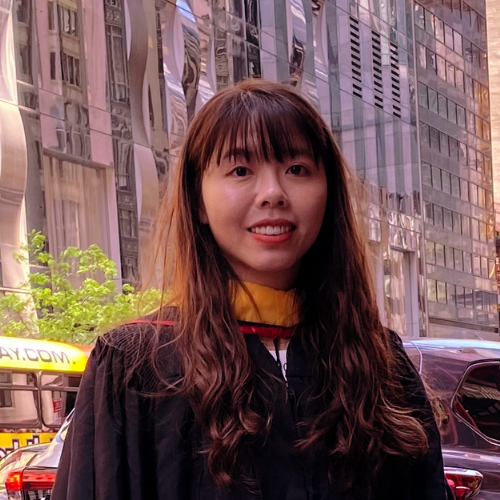During the height of the COVID-19 pandemic, Wei-Hsuan Tseng worked as a pharmacist at a hospital in Taiwan. While grateful for her role in helping patients navigate the health system, she witnessed firsthand the impact socioeconomic status can have on access to care. She was motivated to learn about barriers to care, such as rising costs of medication and treatment and policy decisions affecting patient care. She pursued an MS in Health Policy and Economics at Weill Cornell Medicine (WCM) and graduated in 2023. Now, she is a healthcare policy data analyst at Acumen, LLC.
“I’m lucky to have been able to help [during the pandemic],” Wei-Hsuan explained. “My experience ignited a passion for addressing the underlying issues that affect care outcomes.”
Wei-Hsuan chose to attend WCM because she knew that other students from Taiwan had studied there, and their success encouraged her to apply. When she started the program, it immediately felt like a good fit.
Having no prior experience with data analysis, Wei-Hsuan appreciated learning the fundamentals in Introduction to Biostatistics with STATA Lab, taught by Dr. Arindam RoyChoudhury, associate professor of population health sciences. The Introduction to Applied Econometrics for Health Policy course, taught by Dr. Angelica Meinhofer, assistant professor of population health sciences, allowed her to use those fundamental skills to examine correlations and causal relationships in data analysis. She also worked with Dr. Meinhofer on a research project on the impact of cannabis legalization on crime rates, bolstering her understanding of difference-in-difference methods.
One of the program highlights was her capstone project, which Wei-Hsuan worked on with Dr. Shashi Kapadia, assistant professor of population health sciences and medicine. The project lasts the program's duration and allows students to engage directly with stakeholders in the healthcare field. It culminates in a detailed report and final presentation to the client, program faculty, and fellow classmates.
“We worked in a small team: me, another classmate, and Dr. Kapadia,” Wei-Hsuan explained. “We met weekly to discuss how we could improve our data analysis and determine next steps. The project gave me significant research experience and informed my job search.”
Since it was her first time living away from Taiwan, Wei-Hsuan experienced some initial challenges outside of her coursework. She didn't know anyone in NYC and feared she wouldn't find a new community.
“It was interesting working with classmates of totally different backgrounds,” she said. “Especially with English not being my native language. You spend a lot of time learning to communicate and express what you want to say. However, after a semester, I made friends and really enjoyed hanging out with new people. I was often shy, but it’s important to speak up for yourself.”
Wei-Hsuan completed one of her final research projects alongside Dr. Ali Jalali, assistant professor of population health sciences, who taught Cost-Effectiveness Analysis. In line with her experience as a pharmacist, the course inspired her to work on analyzing the cost-effectiveness of different medications. She plans to focus on health economics and outcomes research in the long run.
“Take on every experience,” Wei-Hsuan advised. “For foreign students, don’t be afraid to speak up or practice your English. I’m especially grateful to have been part of so many research projects, and I feel like it enabled me to do well in interviews. Seize every learning opportunity.”


